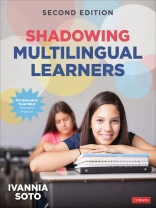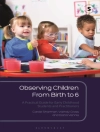Walk in your Students’ Shoes with Multilingual Learner Shadowing
The need for powerful professional learning to enable Multilingual Learners reach their full potential is more profound than ever. MLL shadowing is a way to create urgency around the instructional and academic needs of Multilingual Learners. The MLL Shadowing protocol is used to collect data on MLL’s opportunities for speaking and listening–the building blocks for reading and writing–in our classrooms.
Updated after 10 years of research and practice, the second edition of this bestselling resource includes an overview on the importance of oral language development, information on preparing the shadowing experience, the complete shadowing protocol, a guide for analyzing the shadowing experience and key oral language development strategies. The new edition also adds improved data collection for oral language expression, as well as highlights updated research and classroom practice concerning new policies and programs implemented across the country. A comprehensive guide to ELL shadowing is presented alongside:
- Detailed case studies showing real-world examples
- Guidelines for analyzing and reflecting on the shadowing experience
- Guidelines for shadowing in a virtual environment
- Guidelines for shadowing in a multilingual environment
- An assets-based orientation to student learning and the use of achievement data to improve ELL education
This book provides an entry point for broader, systemic improvement that will serve ELLs in more varied instructional settings, including monolingual and bilingual programs.
Inhoudsopgave
ACKNOWLEDGMENTS
WHAT’S NEW IN THIS EDITION
ABOUT THE AUTHOR
INTRODUCTION
SECTION I: PURPOSE OF SHADOWING
CHAPTER 1: CREATING A SENSE OF URGENCY
Four Essential Shifts Educators Must Make on Behalf of Multilingual Learners
Preparing Teachers to Instruct Multilingual Learners
Organization of the Book
CHAPTER 2: HISTORY AND CONTEXT OF SHADOWING
Development of the Shadowing Process
Types of Shadowing Projects
MLL Shadowing Processes
CHAPTER 3: A DAY IN THE LIFE OF JOSUE, A MULTILINGUAL LEARNER
Student Profile of Josue
Debriefing the MLL Shadowing Experience
SECTION II: RESEARCH BASE
CHAPTER 4: THE ROLE OF ACADEMIC SPEAKING
The 15-Minute Rule
Teacher-Guided Reporting
Graphic Organizer for Teacher-Guided Reporting
Benefits of Language Talk for MLLs
Monitoring Academic Speaking During MLL Shadowing
MLL Shadowing Codes for Academic Speaking
CHAPTER 5: THE IMPORTANCE OF ACTIVE LISTENING
Nunan’s Quadrants of Listening
Coding for Academic Listening
SECTION III: PREPARATION FOR SHADOWING
CHAPTER 6: PREPARING FOR A SHADOWING TRAINING
Organizing and Setting Up a Shadowing Project
Districtwide MLL Shadowing
Data Talk for MLL Shadowing Debriefing
Targeting Professional Development According to MLL Needs
CHAPTER 7: HOW TO USE THE SHADOWING PROTOCOL
MLL Shadowing Protocol Overview
SECTION IV: DEBRIEFING THE SHADOWING EXPERIENCE
CHAPTER 8: ANALYZING AND REFLECTING ON THE RESULTS OF SHADOWING
Debriefing the MLL Shadowing Experience
CHAPTER 9: USING THE RESULTS TO LEVERAGE CHANGE
MLL Shadowing Next Steps: Needs Assessment
SECTION V: NEXT STEPS WITH SHADOWING MULTILINGUAL LEARNERS
CHAPTER 10: NEXT STEPS AND FOLLOW-UP TO SHADOWING MULTILINGUAL LEARNERS
MLL Follow-Up on Academic Language Development
Conclusion
APPENDIX A: SHADOWING MULTILINGUAL LEARNERS RESOURCES
Road to Reclassification: Academic Goal Setting
MLL Shadowing Protocol Form
Norwalk–La Mirada Shadowing Multilingual Learners Sample Agenda: Half-Day Schedule
Santa Barbara County Shadowing Multilingual Learners Sample Agenda
Shadowing Multilingual Learners Next Steps: Needs Assessment
Shadowing Multilingual Learners Experience: Reflection
Blank MLL Student Profile for Shadowing
Norwalk–La Mirada Shadowing Multilingual Learners Sample Agenda: Full-Day Schedule
APPENDIX B: ACADEMIC LANGUAGE DEVELOPMENT RESOURCES
Think-Pair-Share
Discourse Sentence Frames for Multiple Purposes
Listening and Speaking Visual Reminders
FRAYER MODEL—Strategy for Vocabulary Development
Reciprocal Teaching Organizer
Reciprocal Teaching Role Cards
Questioner/Connector Cards
Teacher-Guided Reporting Organizer
Academic Language Development Lesson Plan
The Tuning Protocol
INDEX
Over de auteur
Ivannia Soto, Ph D , is a professor of education and the director of graduate programs at Whittier College, where she specializes in language acquisition, systemic reform for English language learners (ELLs), and urban education. She began her career in the Los Angeles Unified School District (LAUSD), where she taught English and English language development to a population of 99.9% Latinos, who either were or had been multilingual learners. Before becoming a professor, Soto also served LAUSD as a literacy coach as well as district office and county office administrator. She has presented on literacy and language topics at various conferences, including the National Association for Bilingual Education (NABE), the California Association for Bilingual Association (CABE), the American Educational Research Association (AERA), and the National Council of Urban Education Associations. As a consultant, Soto has worked with Stanford University’s School Redesign Network (SRN), West Ed, and CABE, as well as a variety of districts and county offices in California, providing technical assistance for systemic reform for ELLs and Title III. Recently, Soto also directed a CABE bilingual teacher and administrator program across California. Soto has authored and coauthored 12 books, including The Literacy Gaps: Bridge-Building Strategies for English Language Learners and Standard English Learners; ELL Shadowing as a Catalyst for Change, a best seller that was recognized by Education Trust–West as a promising practice for ELLs in 2018; Moving From Spoken to Written Language With ELLs; the Academic English Mastery four-book series; the Common Core Companion four-book series for English language development; Breaking Down the Wall; and Responsive Schooling for Culturally and Linguistically Diverse Students. Together, the books tell a story of how to equitably engage and include multilingual learners by ensuring that they gain voice and an academic identity in the classroom setting. Soto is executive director of the Institute for Culturally and Linguistically Responsive Teaching (ICLRT) at Whittier College, whose mission it is to promote relevant research and develop academic resources for ELLs and Standard English learners (SELs) via linguistically and culturally responsive teaching practices/












